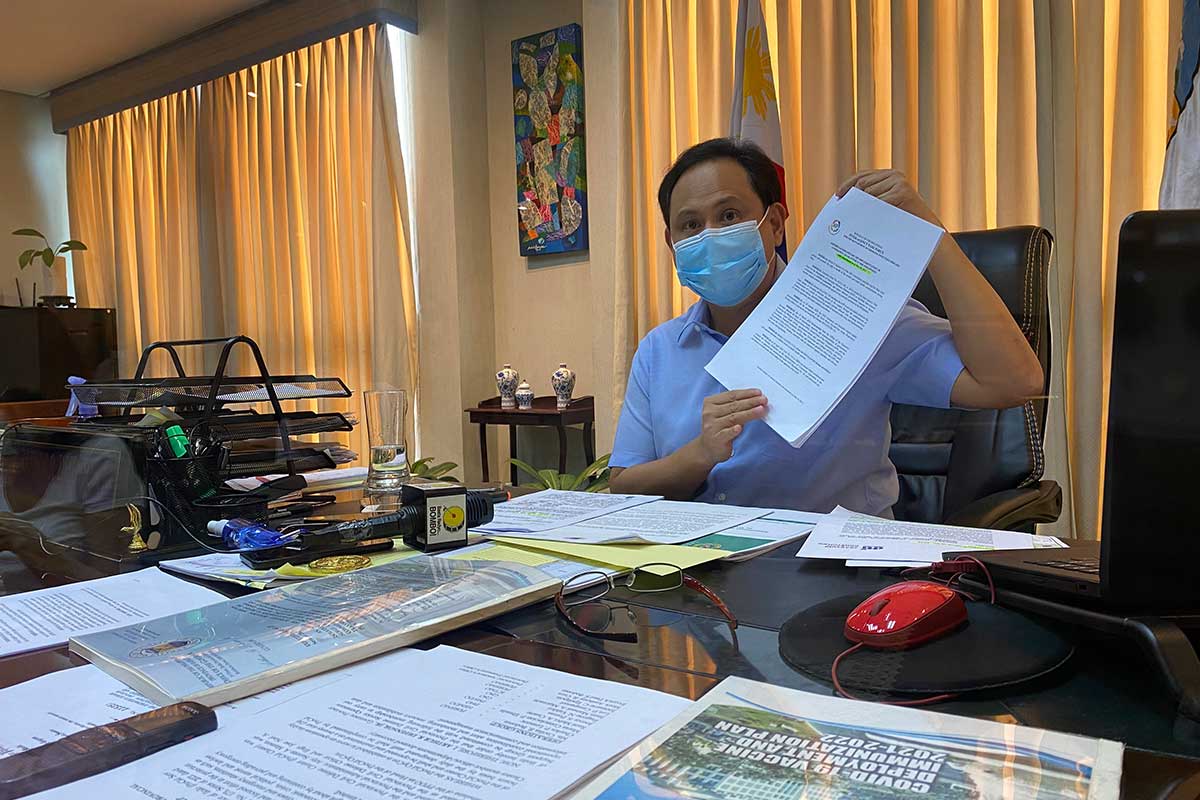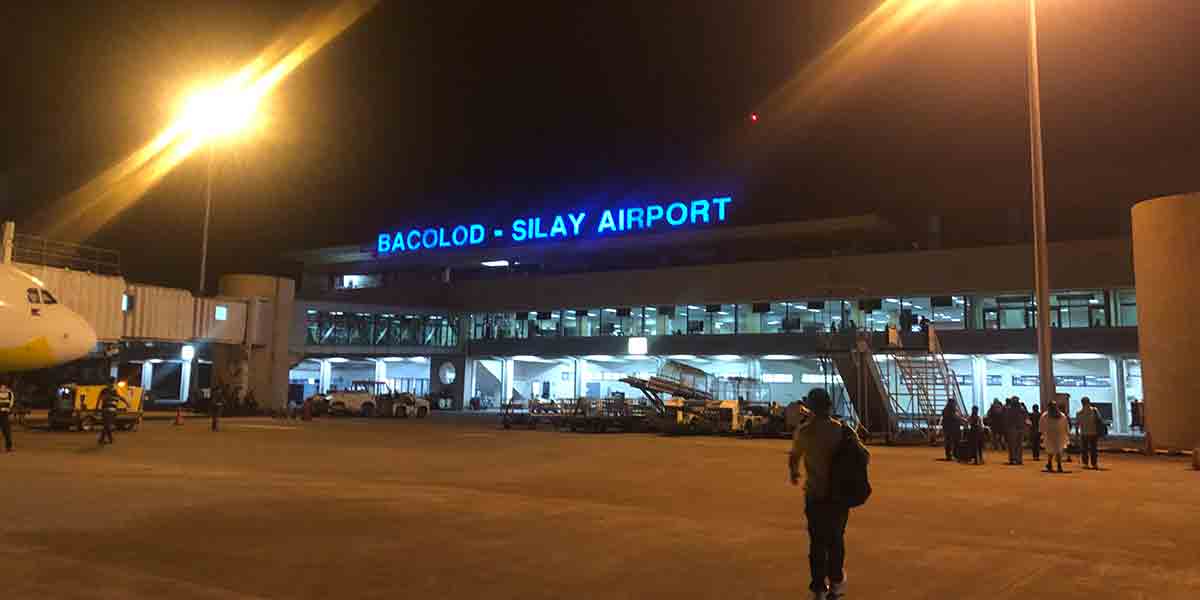
By Joseph B.A. Marzan
Iloilo Governor Arthur Defensor Jr. on Thursday expressed the need for change in community quarantine guidelines for local governments, saying that mandates imposed at the outbreak of the coronavirus disease 2019 (COVID-19) pandemic may no longer be applicable to current circumstances.
In a press conference, Defensor said that based on the provincial government’s COVID-19 statistics, it would be “reasonable to believe” that the province will remain under the Modified Enhanced Community Quarantine (MECQ).
Data from the Iloilo Provincial Health Office (IPHO) as of 12 pm of June 23, 2021 indicated that the province now has 11,122 COVID-19 cases (2,401 active cases, 8,444 recoveries, and 277 deaths).
From June 1 to 23, the province accumulated 3,117 new cases, or 60 percent higher compared to May (1,889), or an average of 136 cases per day.
Defensor said he will wait for the official announcement of the national government via the Inter-Agency Task Force for the Management of Emerging Infectious Diseases (IATF-MEID) regarding the province’s status before his team acts.
He also said the effects of the MECQ restrictions, particularly the lowering of cases, would not be felt even after a month, citing the virus’ 14-to-21-day incubation period.
“Right now, our numbers are leaning towards MECQ (sic), I think moderate MECQ if my memory serves me right. We will wait for the national government for their classification. [E]ven if we have tightened from the previous month, the effects of that tightening up of health protocols, you cannot feel it immediately because that is not their incubation. Just because there’s a virus around, it will disappear when we tighten,” said the governor.
He clarified that he would also retain certain restrictions imposed since May 2021, such as the province-wide liquor ban, restrictions on non-essential travel, and closure of tourism establishments.
More than 1,700 tourism industry workers would receive up to P4,000 pesos in cash allocated from the Tulong Panghanapbuhay sa Ating Disadvantaged/Displaced (TUPAD) program funds downloaded by the Department of Labor and Employment (DOLE) to the Iloilo provincial government.
If the MECQ extension is confirmed, Defensor said he would seek considerations in loosening restrictions on business establishments, particularly the food industry, as existing guidelines were “no longer viable” in terms of the local economy.
The move is a “balancing act” between public health and the economy.
“[I]f that ever happens, we can make adjustments to that because we are also adjusting for our economy. At this time, after one year of community quarantine, it is no longer viable, a province-wide community quarantine measure, putting the entire province under MECQ. When we started in 2020, in the scale of our priorities, community quarantine and health protocols were heavy for us because we were just starting. But we could afford to lessen the economy of the province so that you can have a balance. But in the long term, because community quarantine is not a long-term measure because of the stranglehold on the economy, our priorities are now changed,” he said.
GUIDELINE VARIATIONS
Defensor said he talked to Department of the Interior and Local Government-Region 6 Regional Director Juan Jovian Ingeniero regarding Executive Order (EO) No. 155, as amended, which set the MECQ guidelines in the province.
The DILG earlier sent a letter to the Capitol to raise certain provisions of EO 155 that “deviated” from IATF-MEID’s latest Omnibus Guidelines.
DILG-6 Legal Counsel Atty. Cedric Jaranilla told Daily Guardian last week that Defensor’s MECQ policy on in-place dining contrasted with Section 3 of the IATF-MEID Omnibus Guidelines (amended as of May 20) which provided that both indoor and al fresco (outdoor) dining were prohibited.
EO No. 155 issued on May 12, which was amended by EO No. 200 on June 16, provided that under MECQ, food establishments are allowed to have indoor dining at 10 percent of its regular (pre-pandemic) seating capacity, and up to 50 percent capacity of al fresco dining.
Defensor said the provision was based on Department of Trade and Industry’s (DTI) Memorandum Circular (MC) No. 21-15 issued on April 30, 2021.
The governor described his in-place dining policies as a “balancing act” between public safety and the economy, and a “reconciliation” of the IATF-MEID and DTI edicts.
Defensor also suggested that the national government should clarify and reconcile its own edicts at their level, so as not to burden local officials who will implement them.
“When you have two issuances, you have the option to balance as to how. Will you give this up, 10 percent in a carinderia? For 10 seats in a carinderia, there will only be one filled. Outside, with open air, you can have 50 percent with a barrier like this. At this level, you are also given options when you are the one writing. But the better thing to do, this should be rationalized at the national level, so that there won’t be something like this. It’s always a balancing act, every provision. We are just considering things. This is always a process of putting together the issuances available to us. Of course, your main guide here is the Omnibus Guidelines issued by the Inter-Agency Task Force,” he added.
WELCOME DEVELOPMENT
Defensor said the MECQ in the province was a welcome development as it will redound to more COVID-19 vaccine allocations.
He mentioned securing an unspecified number of additional doses as committed by Presidential Adviser on the Peace Process and “vaccine czar” Secretary Carlito Galvez via phone but declined to say when the vials will arrive.
Galvez told ABS-CBN on Wednesday that vaccine allocations to Region 6 was increased due to its “critical” surge in COVID-19 cases.
“One reason why MECQ is welcome for us, because we can have more vaccines with that, and that is correct. Were at 145 cases a day. That is high, that is high. Another is, without talking of the others, really the ultimate solution is the vaccine. The vaccine is not a short-term feeling, because when you vaccinate, you feel it for weeks. When you look at our classification and the situation of the whole Region 6, every province or city in this region, we really need more,” Defensor said.
‘THANK YOU, JERRY’
Defensor also thanked Iloilo City Mayor Jerry Treñas, who had been very vocal in the past few days to the point of accusing the national government of being stingy in its vaccine allocations to Iloilo and the rest of the Western Visayas region.
“I would like to thank Mayor Treñas for taking the lead in marching for Region 6 to ask. We can have an aggressive initiative in letting the national government know that we are also in need like nine other regions, like us here in Region 6,” the governor said.
But he stopped short of backing Treñas’s belligerent stand, saying he would not like to use the term “neglected” to describe the current vaccine allocations from the national government.
“I think we cannot use the word neglected. It’s really a point of view. I think there is no way, in my point of view, I can characterize our treatment by the national government. It is true that in the past few days, Iloilo province has had fewer [vaccines], considering that we have been put under MECQ. Now there is a development, and the situation seems to change, maybe that is because we are aggressive. It really helps if you are vocal about the situation of the local government units,” he said.
Defensor said he also sent a letter to the national government asking permission to start inoculating persons under priority group A4 (non-medical essential workers), citing growing cases in Oton town, who were mostly residents working in Iloilo City.
The letter, according to him, had not been acted upon for more than a week.





















